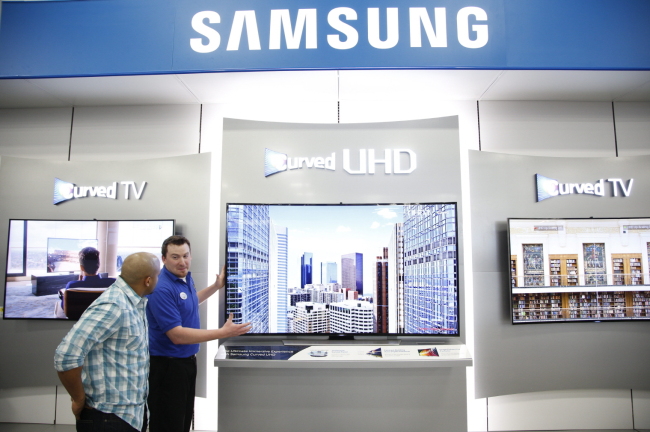South Korean display and TV producers, including Samsung Electronics and LG Electronics, which maintain a firm grip on the global market, will face daunting challenges from Chinese rivals in the coming years, according to market analysts.
“Chinese panel manufacturers are making aggressive investments including building new factories. A competitive edge built in the Chinese panel industry will also boost the Chinese TV businesses,” said Jusy Hong, principal analyst of market research institute IHS Technology, at the IHS Display Analyst Conference 2014 in Seoul Thursday.
“Basking in price competitiveness by using display panels produced by local partners including CSOT and BOE, Chinese TV makers TCL, Hisense, and Skyworth will increase their global presence,” he said.
However, Korean powerhouses Samsung and LG will maintain their leadership for the next three years, he said, as many statistics indicate they are formidable leaders in the market.
The global market share of the two Korean TV makers has increased from 30 percent in 2009 to 38 percent in the first half of this year, topping the global TV market share list, while that of Japanese counterparts dropped from 34 percent to 20 percent during the same period, according to the research firm.
Chinese TV vendors grabbed a 20 percent market share in the first half of this year.
Japanese TV makers including Sony, meanwhile, were expected to face more problems.
Sony is rumored to be considering whether to close its TV business and sell it to a Chinese company, though the company has officially denied speculations on the issue.
Toshiba has sold its LCD TV assembly lines in Poland and Mexico to Taiwanese Compal Electronics, while Sharp is expected to close its Polish TV factory.
Hong expected ultrahigh-definition TVs to rule the market for a while longer until new technologies such as wide color gamut and quantum-dot displays are commercialized in earnest around 2020.
Around 15.2 million UHD TV units are expected to be shipped worldwide by the end of this year.
Meanwhile, IHS Technology cited touchscreens and fingerprint sensors as the tech buzzwords for next year.
“As Apple’s online payment system Apple Pay, utilizing near-field communication technology and a fingerprint sensor, is now stirring the mobile industry, more smartphone vendors will adopt the fingerprint sensors in their devices to beef up security in online payment systems,” said Ricky Park, a director of IHS Technology.
He added that Apple’s iPhone 6 would likely surpass a market sales projection of 180 million to 195 million units, securing more than a 15 percent market share in the global smartphone market.
By Kim Young-won
(wone0102@heraldcorp.com)
“Chinese panel manufacturers are making aggressive investments including building new factories. A competitive edge built in the Chinese panel industry will also boost the Chinese TV businesses,” said Jusy Hong, principal analyst of market research institute IHS Technology, at the IHS Display Analyst Conference 2014 in Seoul Thursday.
 |
| Samsung Electronics’ ultrahigh-definition TVs displayed at a Best Buy store in the U.S. Samsung Electronics |
“Basking in price competitiveness by using display panels produced by local partners including CSOT and BOE, Chinese TV makers TCL, Hisense, and Skyworth will increase their global presence,” he said.
However, Korean powerhouses Samsung and LG will maintain their leadership for the next three years, he said, as many statistics indicate they are formidable leaders in the market.
The global market share of the two Korean TV makers has increased from 30 percent in 2009 to 38 percent in the first half of this year, topping the global TV market share list, while that of Japanese counterparts dropped from 34 percent to 20 percent during the same period, according to the research firm.
Chinese TV vendors grabbed a 20 percent market share in the first half of this year.
Japanese TV makers including Sony, meanwhile, were expected to face more problems.
Sony is rumored to be considering whether to close its TV business and sell it to a Chinese company, though the company has officially denied speculations on the issue.
Toshiba has sold its LCD TV assembly lines in Poland and Mexico to Taiwanese Compal Electronics, while Sharp is expected to close its Polish TV factory.
Hong expected ultrahigh-definition TVs to rule the market for a while longer until new technologies such as wide color gamut and quantum-dot displays are commercialized in earnest around 2020.
Around 15.2 million UHD TV units are expected to be shipped worldwide by the end of this year.
Meanwhile, IHS Technology cited touchscreens and fingerprint sensors as the tech buzzwords for next year.
“As Apple’s online payment system Apple Pay, utilizing near-field communication technology and a fingerprint sensor, is now stirring the mobile industry, more smartphone vendors will adopt the fingerprint sensors in their devices to beef up security in online payment systems,” said Ricky Park, a director of IHS Technology.
He added that Apple’s iPhone 6 would likely surpass a market sales projection of 180 million to 195 million units, securing more than a 15 percent market share in the global smartphone market.
By Kim Young-won
(wone0102@heraldcorp.com)




